The 10 Best Road Trip Cars, According to Science
Dual-zone A/C, plenty of MPG, and enough room for passengers and luggage are all things you'll find on the best road trip vehicles under $40,000.
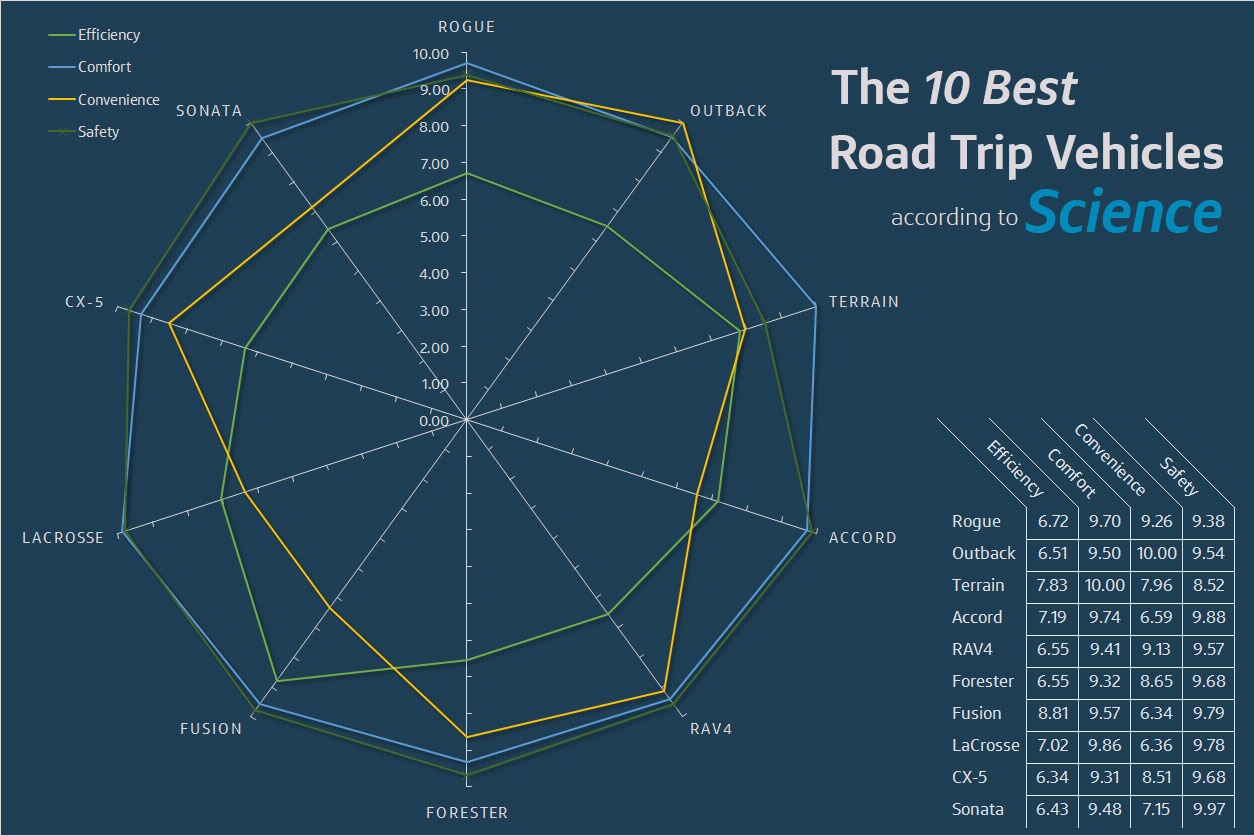 Aaron Miller/Capital One
Aaron Miller/Capital One
Whether you’re heading out for a family vacation or hitting the Great American Road in search of adventure, the automobile plays a huge role in your journey. So, we set out on our own quest to identify the Top 10 Road Trip Vehicles for 2018, using science.
We pored over literally hundreds of cars, features and dimensions in search of the best road trippers you can buy today. Our criteria included:
- Safety: Advanced features like blind spot monitoring and lane keep assist will come in handy when your mind inevitably wanders toward a billboard advertising the world’s largest ball of twine.
- Fuel economy: Only vehicles that can get at least 30 mpg on the highway made the cut, because you don’t want to blow all your kitschy souvenir money on gas, do you?
- Comfort: Dual-zone air conditioning is a must for road warriors who want to stay cool no matter where they sit, front or backseat. Roominess matters, too, so vehicles had to have at least 100 cubic feet of passenger area to make the list. (Sorry, Miata lovers. We’ll get you next time.)
- Cost: We capped it at $40,000, because you can’t afford the ultimate road trip if you spend all your money on a car.
We also awarded due credit to vehicles with creature comforts like ventilated seats, premium stereo systems and cavernous luggage areas. We compared headroom, shoulder room and leg room, among other things. In the end, we built a ranking system focused on what this is all about: great road trips.
The results? Behold: The Top 10 Road Trip Vehicles you can buy right now, according to science.
The Top Ten:
1. Nissan Rogue FWD SL
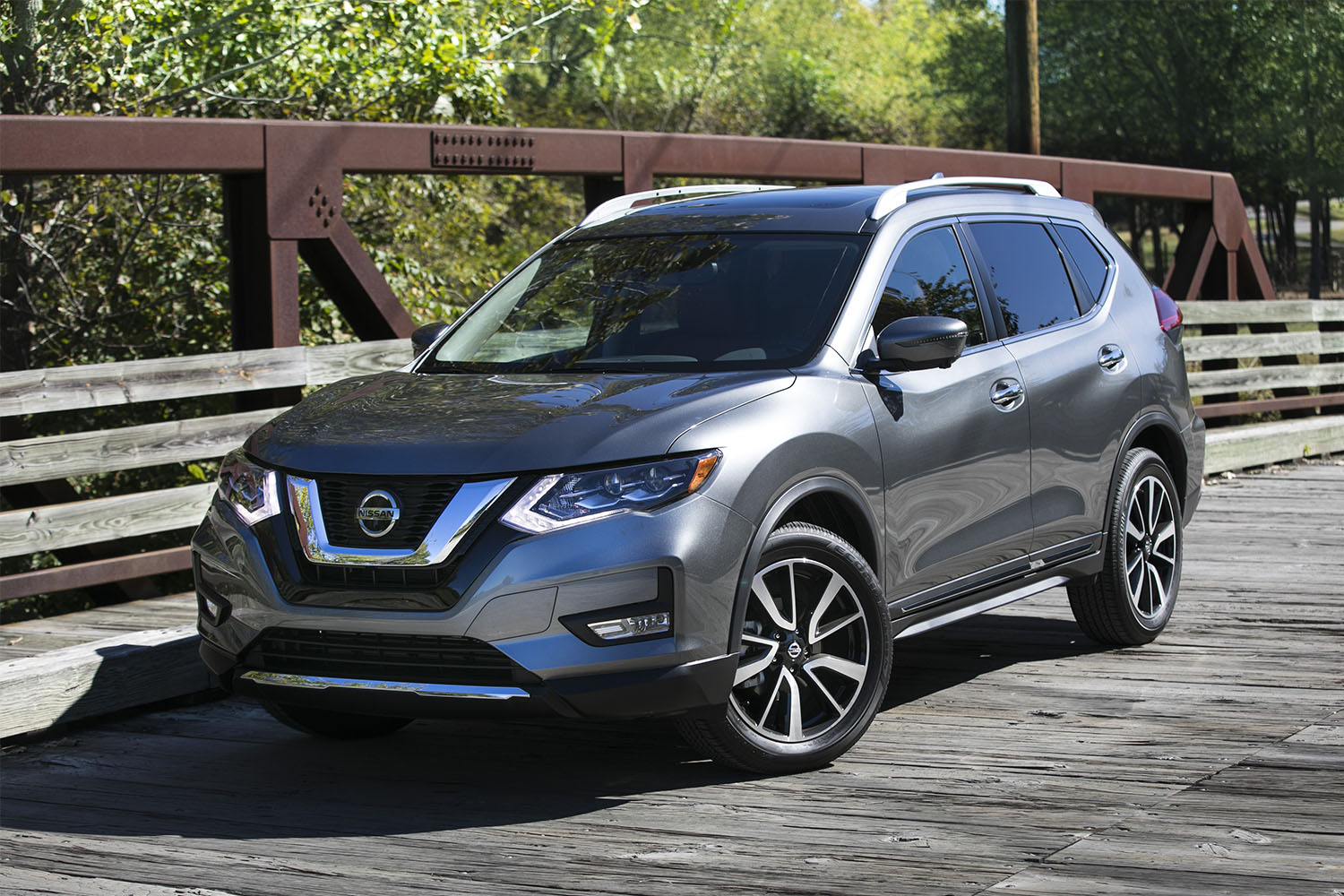 Courtesy of Nissan
Courtesy of Nissan
- MSRP: $31,060
- How it rates: Efficiency: 6.72; Comfort: 9.70; Convenience: 9.26; Safety: 9.38
- Why it makes the list: Rogue acquits itself very well in many areas, which is why it squeaks out the overall win as best road trip vehicle under $40,000. It scores above average in comfort, boasting the third highest seating room of any vehicle on this list. With the most cargo area – and second most torque-to-towing capacity – of any eligible vehicle, it also scores very well in terms of convenience. It’s worth noting that the all-wheel drive version performs almost as well, though its extra weight costs it points in both on-ramp acceleration and fuel economy.
- Fact that might surprise you: Although its National Highway Traffic Safety Administration (NHTSA) crash ratings for frontal (4) and rollover collisions (4) are mid-pack, Rogue SL actually ranks above average for safety, thanks to features like lane departure warning.
2. Subaru Outback 2.5i Touring
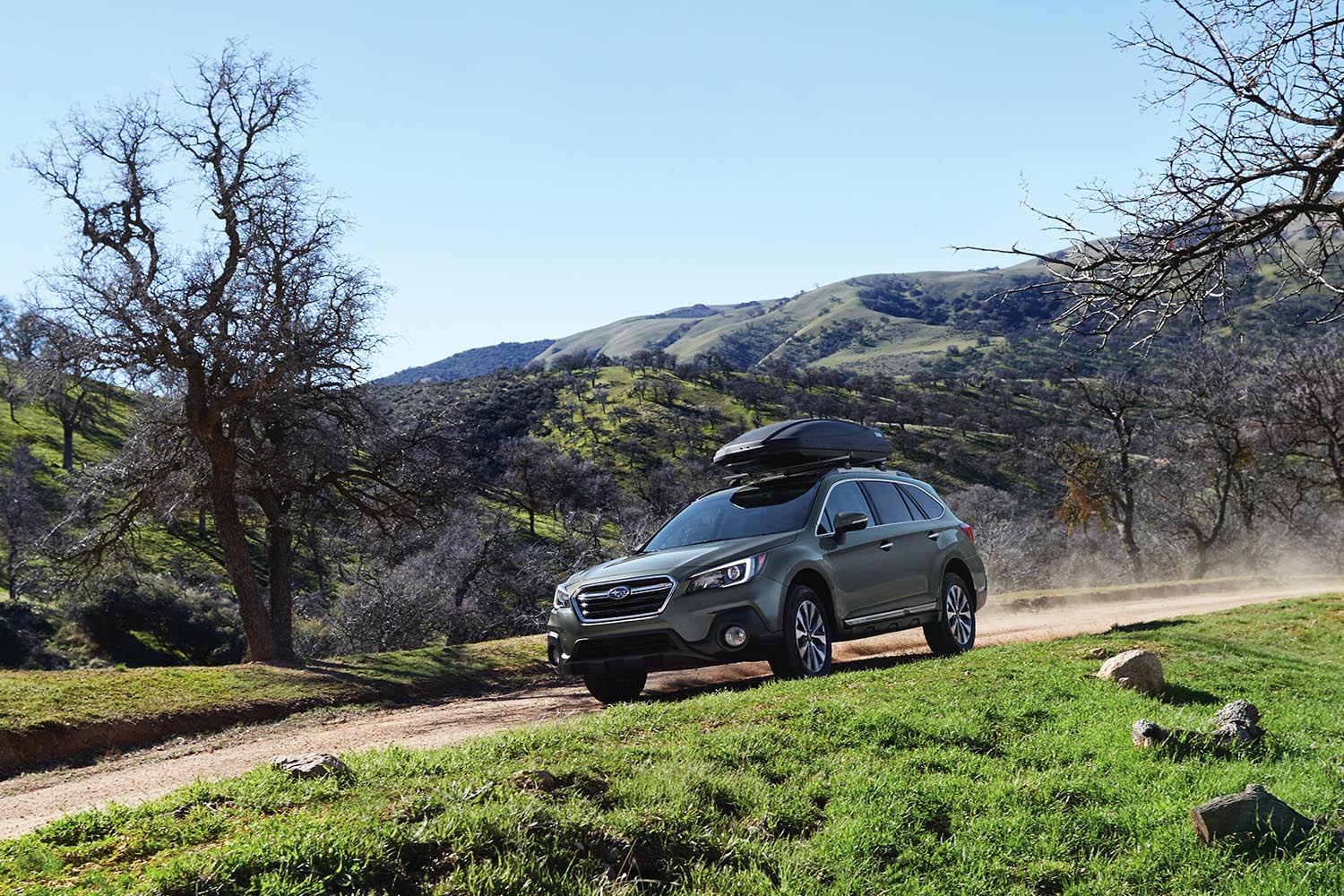 Subaru
Subaru
- MSRP: $36,490
- How it rates: Efficiency: 6.51; Comfort: 9.50; Convenience: 10.00; Safety: 9.54
- Why it makes the list: No vehicle here has a larger fuel tank than Subaru’s Outback, and as a result, its expanded range combines with its generous cargo area and towing capacity to lead all vehicles in road trip convenience – you simply don’t have to stop as often and can carry more luggage than most. As with Rogue, it doesn’t score poorly in any single category, no doubt helped by the Touring trim’s expanded set of safety features.
- Fact that might surprise you: Road trip-relevance is a de-facto theme on Outback Limited’s features list, with tech options like navigation and adaptive cruise control included at no extra charge.
3. GMC Terrain FWD SLT Diesel
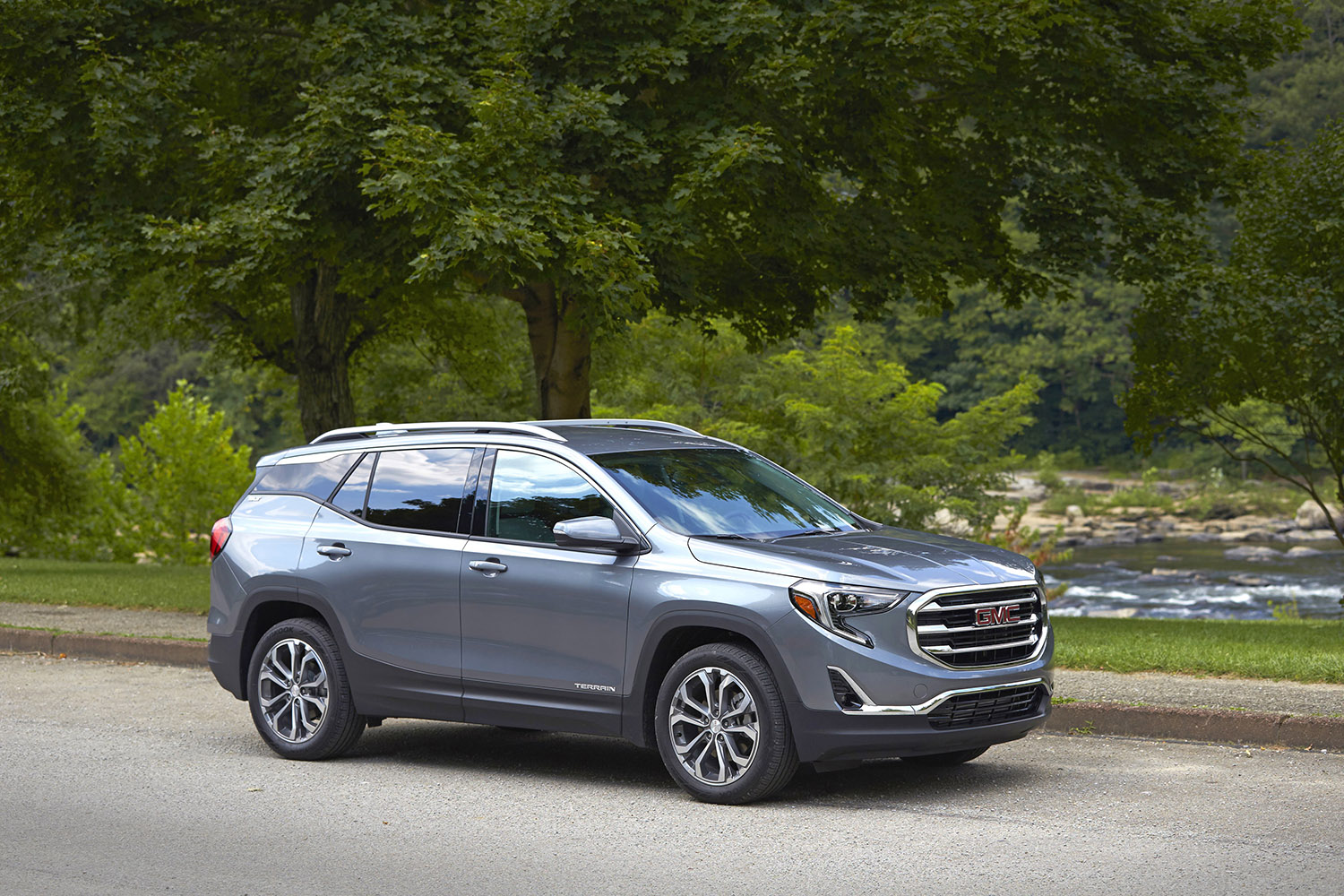 GMC
GMC
- MSRP: $34,200
- How it rates: Efficiency: 7.83; Comfort: 10.00; Convenience: 7.96; Safety: 8.52
- Why it makes the list: If you spend 80% of your road trip on the highway, Terrain’s Diesel powertrain would get you 36.8 mpg, according to EPA figures, which helps it outpace similar-sized competition when looking at efficiency. It’s the comfort section that gives Terrain its largest boost, however, where its multi-zone automatic climate control and available rear seat entertainment help it to one of the highest scores of any vehicle.
- Fact that might surprise you: Terrain’s SLT trim scored highest in the Comfort category on the back of a generous array of included or available options, including an interior power outlet and rear-seat entertainment system.
4. Honda Accord Touring
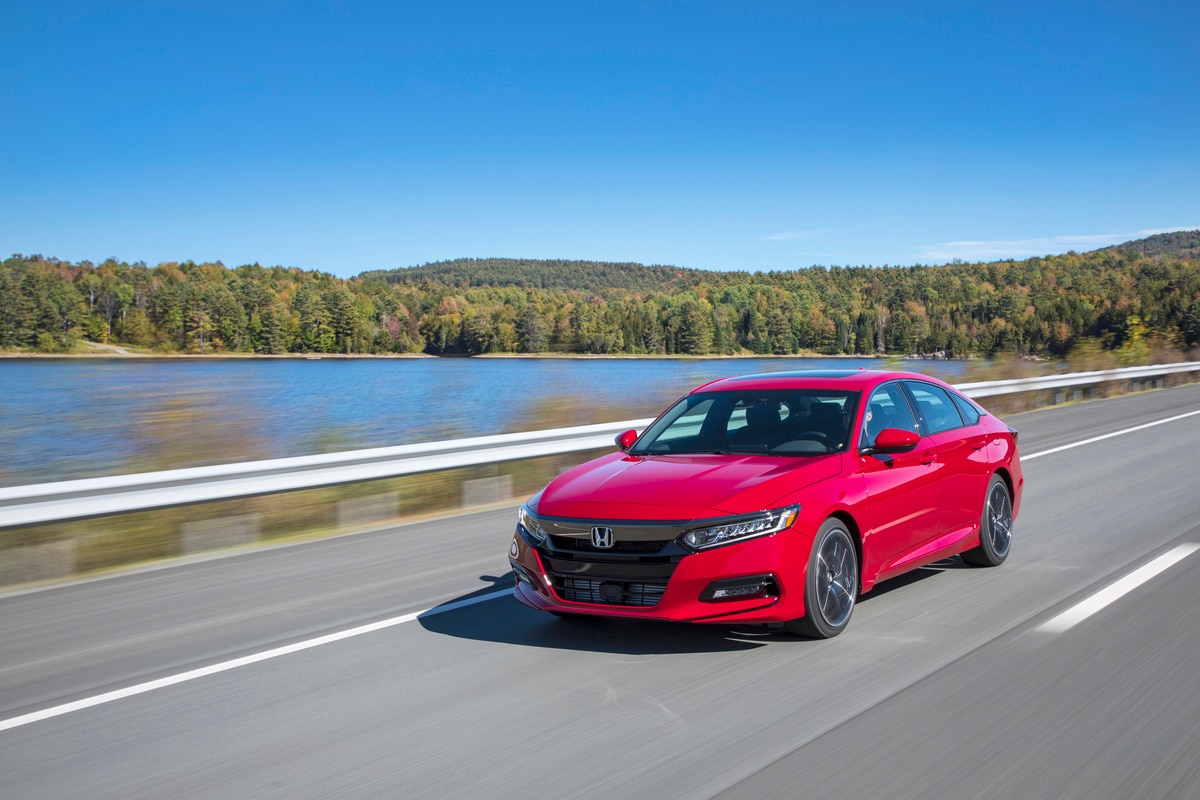 Honda
Honda
- MSRP: $33,800
- How it rates: Efficiency: 7.19; Comfort: 9.74; Convenience: 6.59; Safety: 9.88
- Why it makes the list: Safety is certainly one of Accord’s strong suits, with not only stellar NHTSA crash-test results but standard features like a blind spot monitor and lane departure warning that are virtually tailor-made for long stints of highway driving. It also comes with an admirable set of creature comforts, like power seats that are both heated and cooled – meaning you’ll be less likely to have embarrassing sweat stains after a several-hour drive.
- Fact that might surprise you: Accord is one of just two vehicles in the top 10 (along with Buick’s LaCrosse) to receive a full 5 stars in every NHTSA crash test.
5. Toyota RAV4 Hybrid Limited
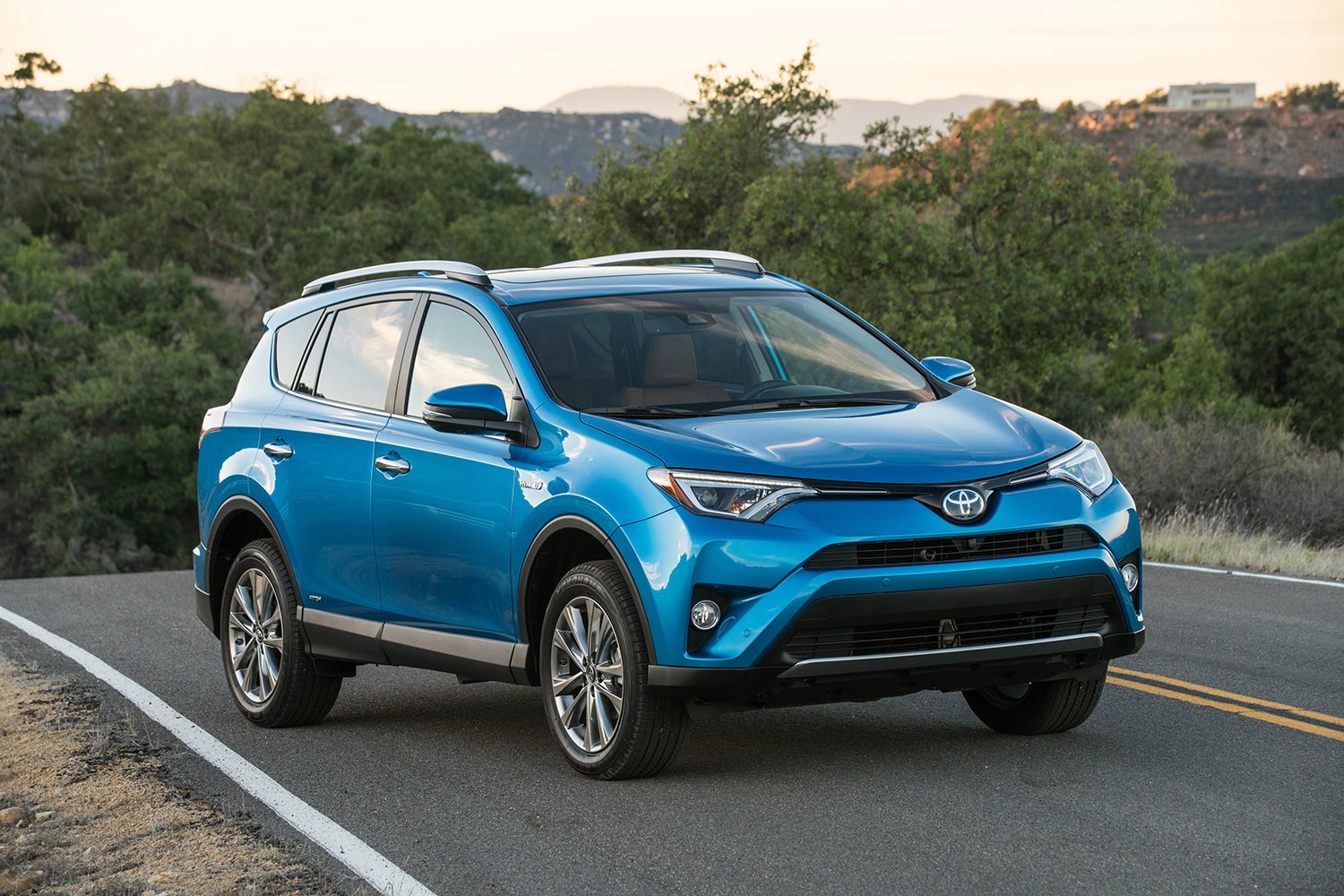 Toyota
Toyota
- MSRP $34,130
- How it ranks: Efficiency: 6.55; Comfort: 9.41 Convenience: 9.13 Safety: 9.57
- Why it makes the list: Safety is one of the areas on which Toyota likes to hang its proverbial hat, and standard features like lane keeping assist, lane departure warning and a blind spot monitor help RAV4’s road trip cause. So, too, does a spacious cargo area, standard navigation, and adaptive cruise control. Of course, having a hybrid powertrain that returns above average fuel economy doesn’t hurt, either.
- Fact that might surprise you: Compared to the non-hybrid RAV4, RAV4 Hybrid loses nearly three cubic feet of cargo area. However, it gains a whopping 12mpg in city use, 2mpg on the highway, and 8 mpg in combined use, elevating it past our combined and highway mpg thresholds.
6. Subaru Forester 2.5i Touring
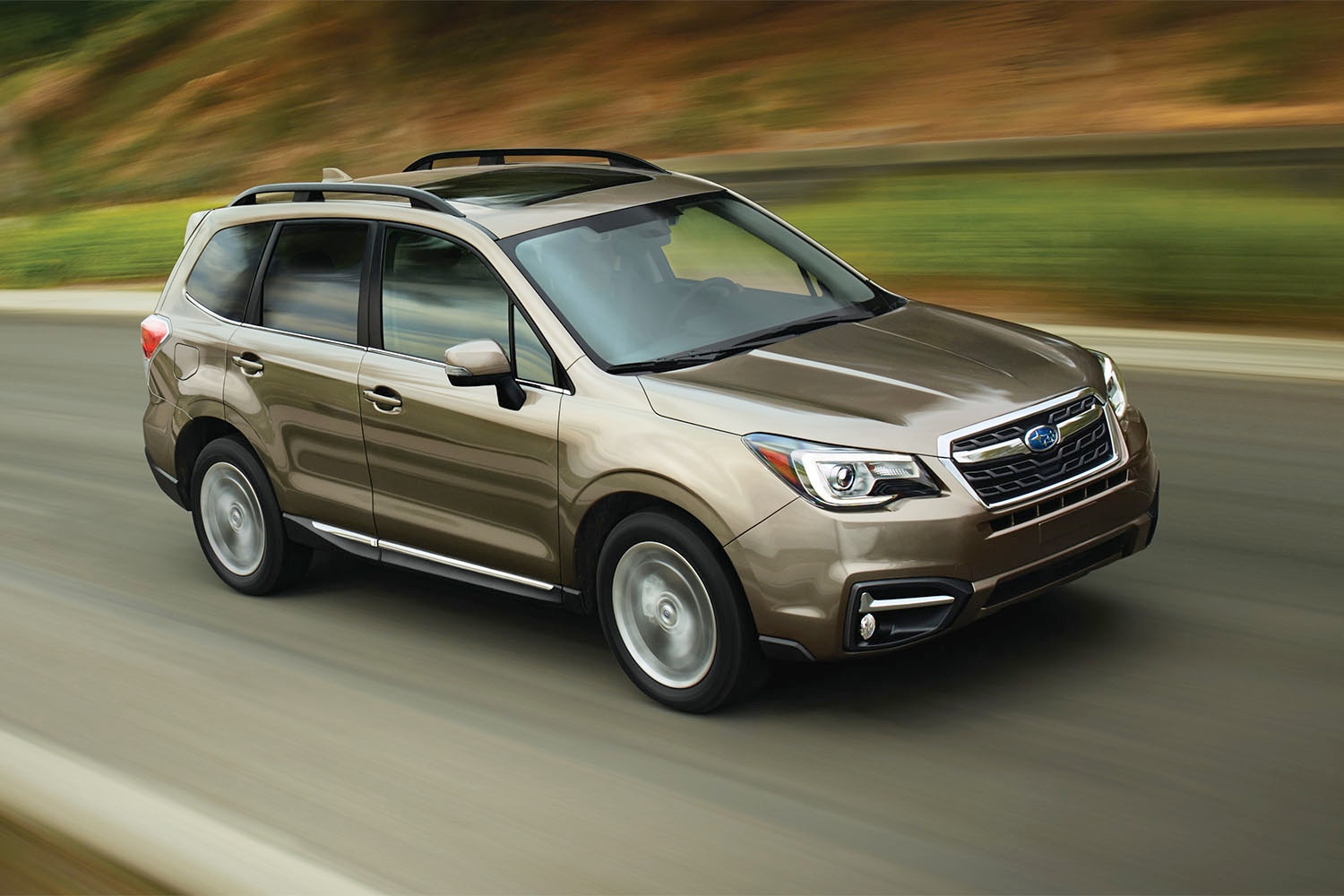 Subaru
Subaru
- MSRP: $33,090
- How it rates: Efficiency: 6.55; Comfort: 9.32; Convenience: 8.65; Safety: 9.68
- Why it makes the list: Subaru’s Forester crossover is comparable in several key areas to the Outback wagon, with marginally better fuel economy and an extra knee airbag. It does best its sibling in safety, however, where it placed 6th overall.
- Fact that might surprise you: In terms of torque to towing capacity, which gauges the ease of bringing along additional road trip supplies, Forester scores 5th among all eligible vehicles, coming in just above the Hyundai Tucson.
7. Ford Fusion Hybrid Platinum
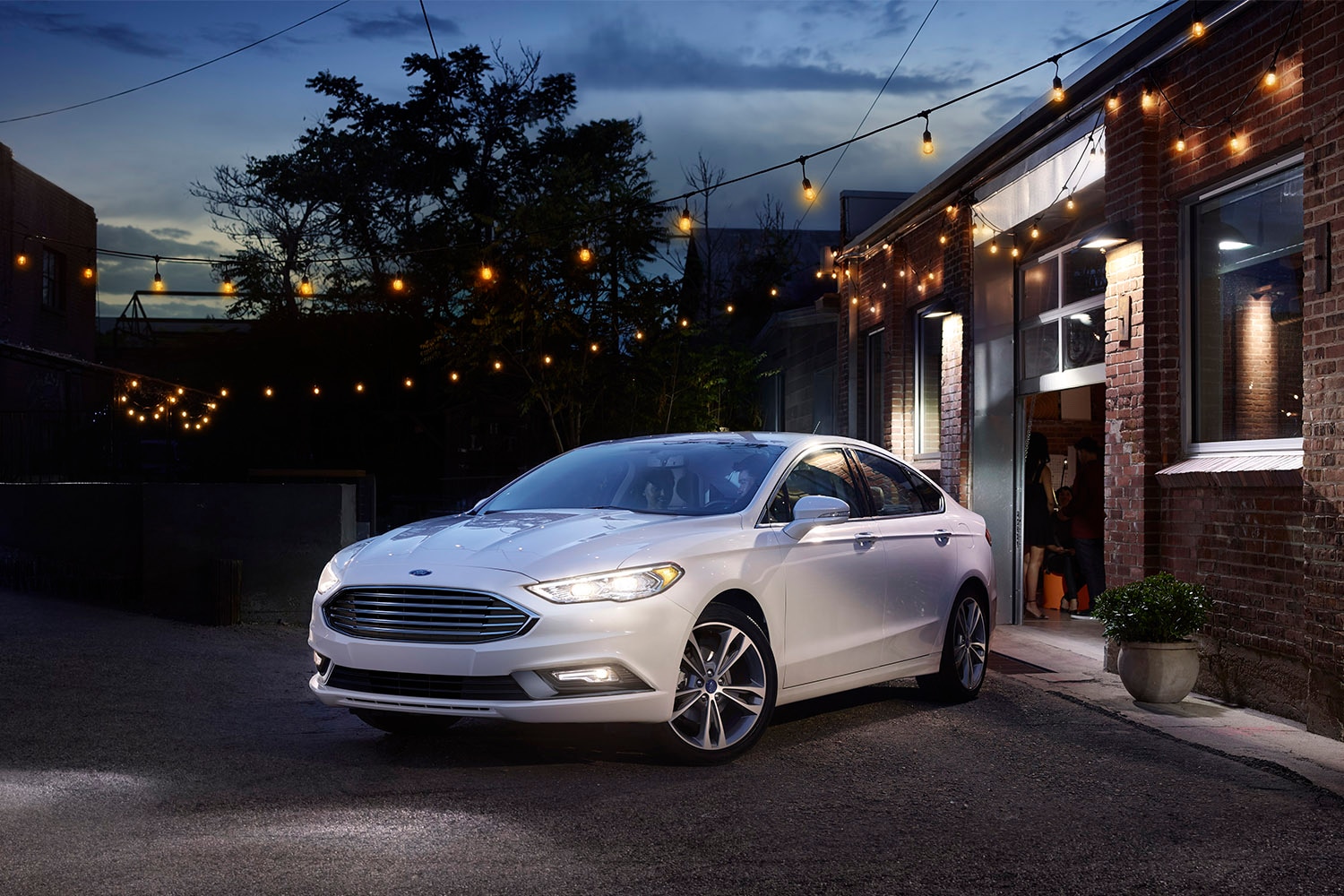 Ford
Ford
- MSRP: $37,370
- How it rates: Efficiency: 8.81; Comfort: 9.57; Convenience: 6.34; Safety: 9.79
- Why it makes the list: In case you missed the news, Ford has decided
. For now, though, Fusion soldiers on and, in its Platinum trim, it includes a slew of high-tech safety features – enough that only the lack of a spare tire prevents it from beating the Hyundai Sonata to the top spot in the safety category. While it doesn’t offer the same level of road trip-relevant interior features as some of the leaders, it’s still above average, which is more than enough to secure a top ten spot. - Fact that might surprise you: Fusion Hybrid offers less room for your luggage than the non-hybrid version, which actually scores higher for convenience (and was first overall, thanks to that spare tire). However, the Hybrid’s superior efficiency is enough for it to cruise past its sister offering.
8. Buick LaCrosse Premium FWD
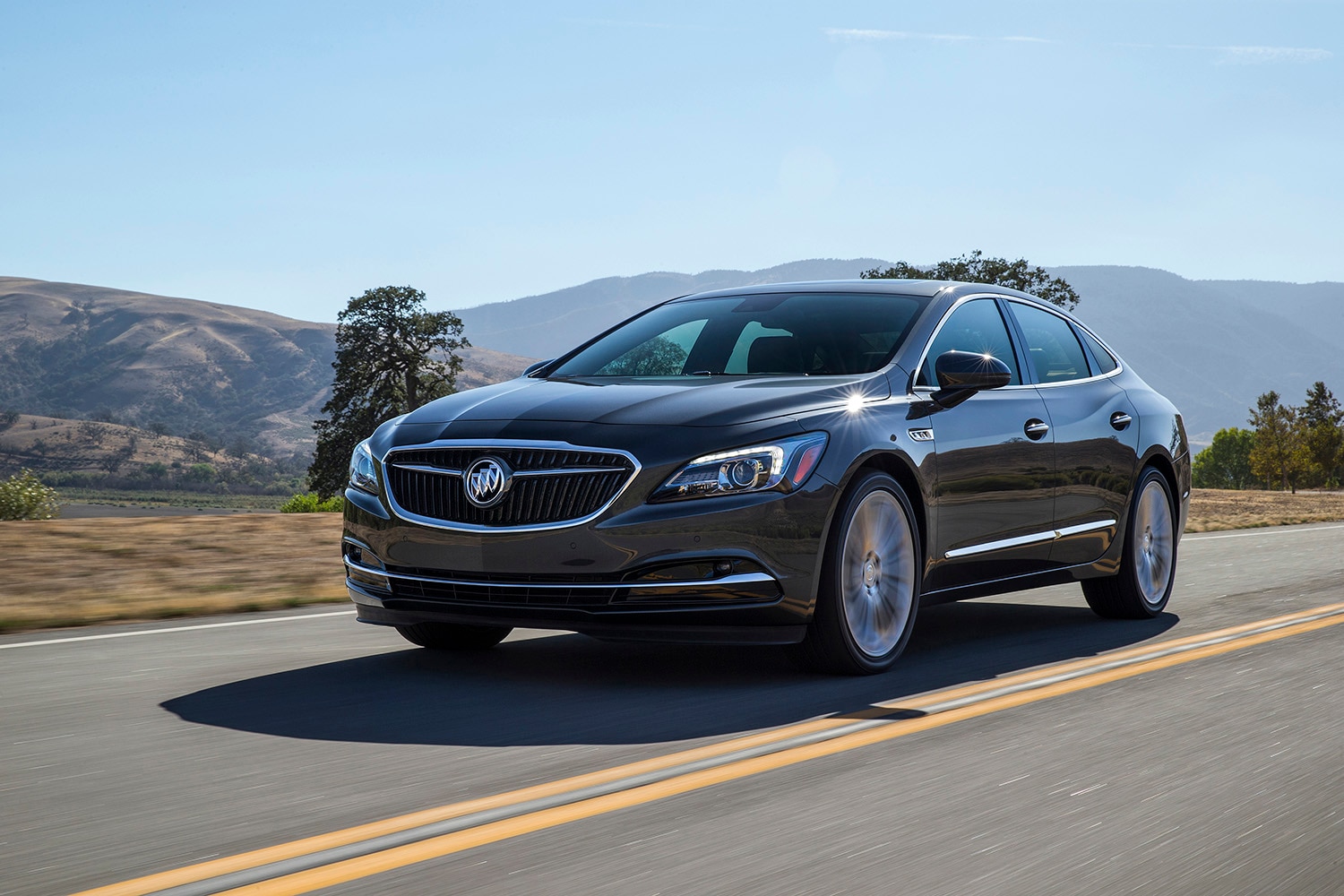 Buick
Buick
- MSRP: $38,680
- How it rates: Efficiency: 7.02; Comfort: 9.86; Convenience: 6.36; Safety: 9.78
- Why it makes the list: Unsurprisingly, Buick’s LaCrosse sedan trails its crossover competition in cargo area, but it more than makes up for that in comfort features, with included equipment ranging from an auxiliary power outlet, to a Wi-Fi hotspot and, crucially, air conditioning for rear seat occupants.
- Fact that might surprise you: As with the Accord above, LaCrosse scored a perfect 5 on each NHSTA crash test. It’s the presence of cooled front seats, however, that elevate LaCrosse above Mazda CX-5, with which it is otherwise neck-and-neck.
9. Mazda CX-5 Grand Touring FWD
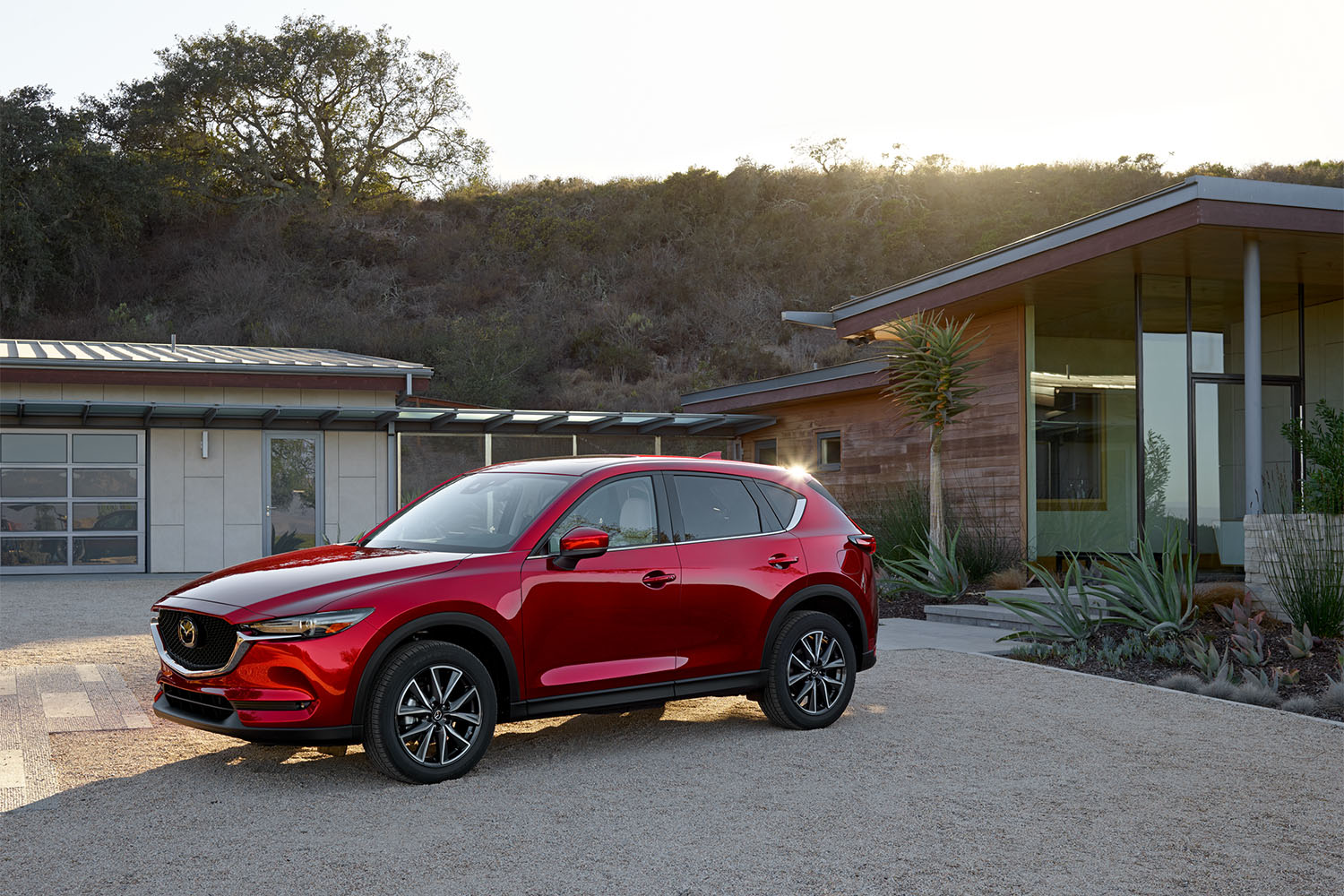 Mazda
Mazda
- MSRP: $29,645
- How it rates: Efficiency: 6.34; Comfort: 9.31; Convenience: 8.51; Safety: 9.68
- Why it makes the list: No crossover scores better in safety than CX-5, which ties with Forester and the VW Passat for 6th overall in the section. It also received a boost by its towing performance, which is 4th overall, ahead of fellow crossovers Rogue and Tucson.
- Fact that might surprise you: The only eligible vehicle rated to tow more than CX-5 is Subaru’s Outback.
10. Hyundai Sonata Limited 2.0T
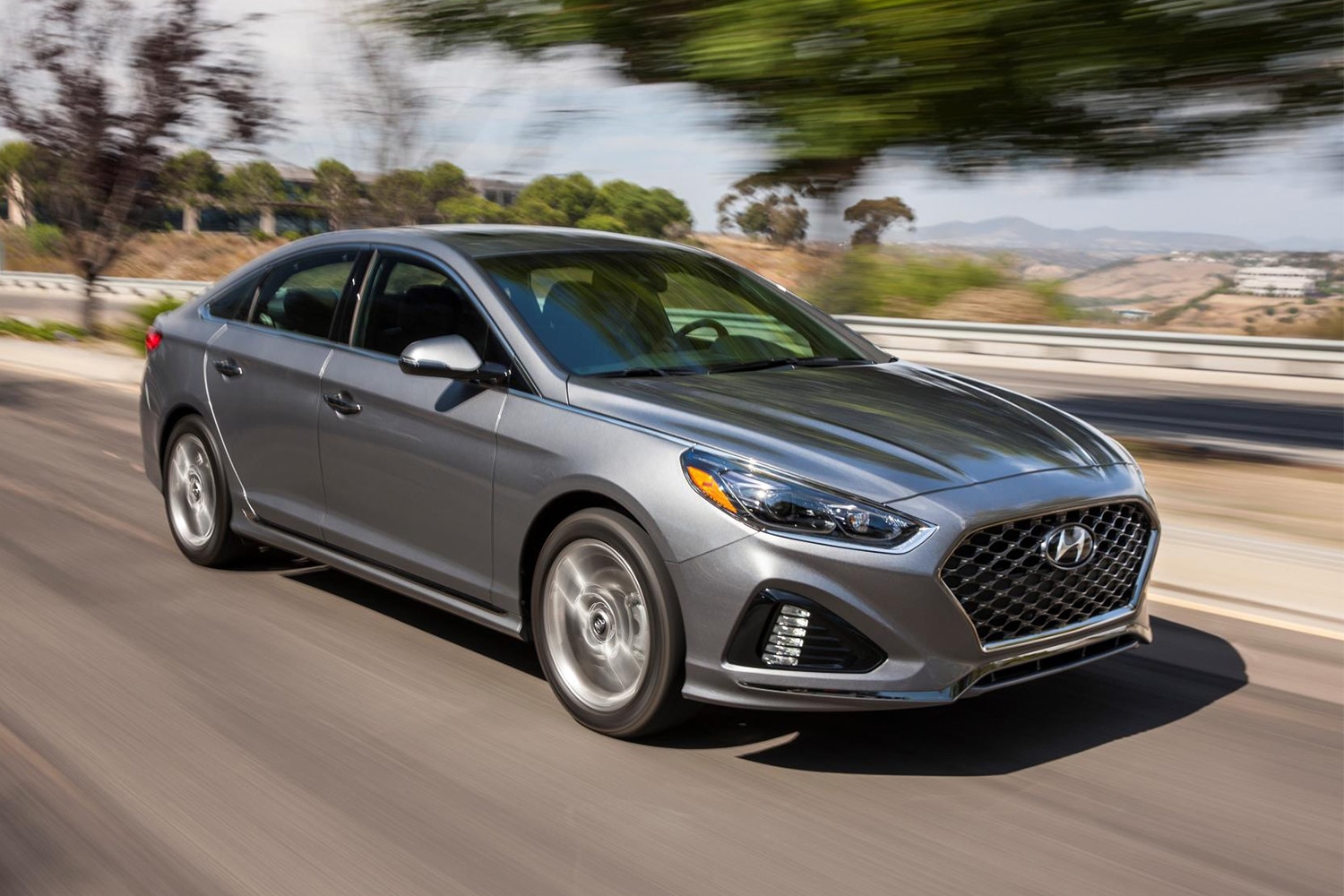 Hyundai
Hyundai
- MSRP: $32,450
- How it ranks: Efficiency: 6.43; Comfort: 9.48; Convenience: 7.15; Safety: 9.97
- Why it makes the list: The fact that the non-hybrid Sonata makes this list over the Sonata Hybrid might surprise a few people, especially given what it sacrifices in fuel economy – an extra $14 per 500-mile road trip, for starters. However, the hybrid’s battery takes up a lot of room. The tradeoff for the hybrid’s fuel economy is less cargo space, which not only impacts how much you can take on a road trip, it means the hybrid doesn’t come with a spare tire.
- Fact that might surprise you: Sonata has more space per person than any vehicle in the top ten, barely edging out both Rogue and Fusion.
The Science of Finding a Good Road Trip Vehicle
 Aaron Miller/Capital One
Aaron Miller/Capital One
To find the best road trip cars, we began by looking at the complete list of each vehicle’s features and specifications, and went line-by-line. We then assigned weight to attributes that are particularly desirable on road trips. Having a full-size spare tire, for example, is deemed valuable in the event of a puncture, because with a mini-spare or even run-flat tires you’d have no choice but to find the nearest possible shop…even if you’re in the middle of nowhere. The ability to merge onto highways quickly matters, too. As does the amount of room you and your passengers have to yourselves for hours on end.
In the end, we looked at four key categories. For safety, we included NHTSA test rankings as well as nearly 30 different safety features, accounting for everything from lane departure warnings to knee airbags. Comfort included another couple dozen features, and also looked at the head, shoulder and leg room for each occupant. Convenience is a metric that combines cargo area, power-to-weight ratio (which impacts acceleration and thus highway merging), total range (which is dependent on both MPG and the size of the fuel tank), and what we’re calling the torque-to-towing capacity, which loosely approximates the ease with which a vehicle can tow. Finally, we looked at efficiency. Since this is about road trips, we created our own combined MPG number, comprised of 80% highway miles and 20% city. We then looked at how much you’d have to spend on fuel over a 500-mile trip, using
After we gathered and calculated all those numbers, we assigned each vehicle an additional score based on its rank in each category (last is worth one point, next to last is two, etc). We also included a bonus point system** for those that finished at the head of the class, thus rewarding excellence in an individual category. Both scoring systems yield results that include anomalies, and as a result, the final score reflects both the average ranking per category and the average score per category, relative to all the other vehicles. By doing so, outliers in any particular section have been eliminated.
For ease of understanding, the category rankings shown are scaled from 1-10. The raw scores for each category mean that the categories don’t account for the same percentage of the total, with comfort and convenience worth more of the overall score than safety and efficiency.
*AAA fuel prices retrieved on May 11, 2018.
**Bonus points awarded based on an
Written by humans.
Edited by humans.
 Aaron Miller
Aaron MillerAs a veteran automotive journalist, I have been fortunate enough to drive some of the most desirable cars on the planet and get to know some of the most important people in the industry. Before joining Capital One, I served as the Cars Editor for a major national website, and covered industry news and analysis for well-known automotive-specific sites. I also wrote feature articles and reviews for niche enthusiast websites. I’ve been obsessed with cars since—literally—before I can remember, with my collection of die-cast and slot cars taking center stage during my formative years. Simply put, for me, working isn’t really “work.”
Related articles
View more related articles